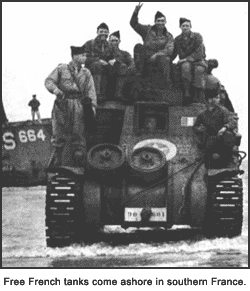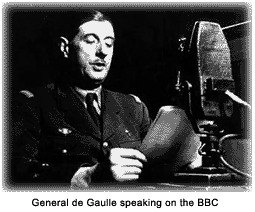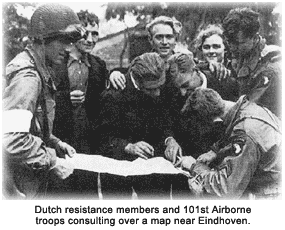Partisan resistance is the term used to describe quasi-military individual and small-group covert activities. The practice is common in countries occupied by a victorious military force. Unable to retaliate with equal force, patriotic citizens often band together secretly to fight their oppressor. On the other hand, collaborators (quislings¹), were citizens of an occupied country who, out of fear or resentment of their own government, cooperate with the enemy. Partisan resistance movements have existed long before recorded history. In the Western tradition, Greek historian Herodotus referred to partisans in his histories.
 Partisan resistance arose in all theaters of World War II. The German Blitzkrieg, (Lightning war), overran much of Europe from 1939 through 1942. As a result, small pockets of resistance fighters formed in towns and cities across the continent. Other notable partisan groups arose in Italy, Greece, the Balkans, China, and the Philippines. Numerous freedom fighters died in obscurity, but some became famous and influential. Some even rose to lofty governmental positions in postwar years.
One of the more famous groups in World War II was the French Resistance. The Free French Forces (Forces Françaises Libres) were fighters who decided to go on fighting against Germany after the Fall of France and German occupation, and to fight against Vichy France². The French resistance fighters ambushed German units, abducted and killed German army officers, obliterated bridges, wrecked trains and gave British bombers directions to such German targets as troop trains.
General Charles de Gaulle had recently been appointed minister of war in the French Cabinet in 1940, when he escaped from the German occupation in France. On June 18, De Gaulle spoke to the French people from London, via BBC radio. The British Cabinet had attempted to block the speech, but was overruled by Winston Churchill. De Gaulle appealed to French men and women to join in the fight against Adolf Hitler and the Nazis. In France, de Gaulle's "Appeal of June 18" could be heard nationwide. To this day, it remains one of the most famous speeches in French history. Despite repeated broadcasts, by the end of July that year, only 7,000 people had volunteered to join the Free French forces.
The Free French Navy had 50 ships and 3,600 men operating as an auxiliary force to the Royal Navy. In autumn of 1940, the French colonies of Chad, Cameroon, Moyen-Congo, French Equatorial Africa, and Oubangi-Chari joined the Free French side. French colonies in New Caledonia, French Indochina, French Polynesia, Saint-Pierre and Miquelon, and the New Hebrides joined later. Many French colonial troops were participated in Operation Anvil/Dragoon, the Allied invasion of southern France near Marseilles.
Partisan resistance arose in all theaters of World War II. The German Blitzkrieg, (Lightning war), overran much of Europe from 1939 through 1942. As a result, small pockets of resistance fighters formed in towns and cities across the continent. Other notable partisan groups arose in Italy, Greece, the Balkans, China, and the Philippines. Numerous freedom fighters died in obscurity, but some became famous and influential. Some even rose to lofty governmental positions in postwar years.
One of the more famous groups in World War II was the French Resistance. The Free French Forces (Forces Françaises Libres) were fighters who decided to go on fighting against Germany after the Fall of France and German occupation, and to fight against Vichy France². The French resistance fighters ambushed German units, abducted and killed German army officers, obliterated bridges, wrecked trains and gave British bombers directions to such German targets as troop trains.
General Charles de Gaulle had recently been appointed minister of war in the French Cabinet in 1940, when he escaped from the German occupation in France. On June 18, De Gaulle spoke to the French people from London, via BBC radio. The British Cabinet had attempted to block the speech, but was overruled by Winston Churchill. De Gaulle appealed to French men and women to join in the fight against Adolf Hitler and the Nazis. In France, de Gaulle's "Appeal of June 18" could be heard nationwide. To this day, it remains one of the most famous speeches in French history. Despite repeated broadcasts, by the end of July that year, only 7,000 people had volunteered to join the Free French forces.
The Free French Navy had 50 ships and 3,600 men operating as an auxiliary force to the Royal Navy. In autumn of 1940, the French colonies of Chad, Cameroon, Moyen-Congo, French Equatorial Africa, and Oubangi-Chari joined the Free French side. French colonies in New Caledonia, French Indochina, French Polynesia, Saint-Pierre and Miquelon, and the New Hebrides joined later. Many French colonial troops were participated in Operation Anvil/Dragoon, the Allied invasion of southern France near Marseilles.
 Another example of a partisan movement is Belarus. During the 1930s, mass executions carried out under Soviet dictator Josef Stalin, as well as political persecution, caused many Belarus citizens to eagerly welcome the Wehrmacht (German army) during Operation Barbarossa in 1941. At that time a wide collaborative movement had emerged in Belarus. An estimated 120,000 Belarusians had sided with the Nazis. By summer 1942, however, the sentiments in the Belarusian population had turned strongly anti-Nazi, and serious partisan and underground resistance fighting flourished in the occupied territory in Belarus. By 1943 there were 448 Belarusian partisan detachments and 64 diversion groups, numbering approximately 58,000 partisan fighters.
In Holland, one of the first tangible signs that the Germans were in control was the matter of films. After the capitulation, all British movies disappeared from the screens overnight. So did most American movies that were quickly replaced by German productions. In the week before the invasion, Dutch moviegoers could see Robert Donat in Good-bye Mr. Chips or Greta Garbo in Ninotchka. The Dutch now had to be satisfied with the likes of Hans Alberts or that reigning queen of German musical comedy, Zarah Leander. Whereas Miss Leander was probably not too objectionable to most Dutch, many people could not stomach the German newsreels, which were included in all film programs.
There was something insufferable about having to watch yet another German victory in the West or the Führer fulminating yet again against Winston Churchill. In fact, in what came to be one of the first manifestations of Dutch resistance, people booed or walked out while a German newsreel was in progress. German officials became so annoyed that one of their earliest decrees stipulated that patrons were forbidden to leave a movie house any time a German newsreel was on the screen.
Another example of a partisan movement is Belarus. During the 1930s, mass executions carried out under Soviet dictator Josef Stalin, as well as political persecution, caused many Belarus citizens to eagerly welcome the Wehrmacht (German army) during Operation Barbarossa in 1941. At that time a wide collaborative movement had emerged in Belarus. An estimated 120,000 Belarusians had sided with the Nazis. By summer 1942, however, the sentiments in the Belarusian population had turned strongly anti-Nazi, and serious partisan and underground resistance fighting flourished in the occupied territory in Belarus. By 1943 there were 448 Belarusian partisan detachments and 64 diversion groups, numbering approximately 58,000 partisan fighters.
In Holland, one of the first tangible signs that the Germans were in control was the matter of films. After the capitulation, all British movies disappeared from the screens overnight. So did most American movies that were quickly replaced by German productions. In the week before the invasion, Dutch moviegoers could see Robert Donat in Good-bye Mr. Chips or Greta Garbo in Ninotchka. The Dutch now had to be satisfied with the likes of Hans Alberts or that reigning queen of German musical comedy, Zarah Leander. Whereas Miss Leander was probably not too objectionable to most Dutch, many people could not stomach the German newsreels, which were included in all film programs.
There was something insufferable about having to watch yet another German victory in the West or the Führer fulminating yet again against Winston Churchill. In fact, in what came to be one of the first manifestations of Dutch resistance, people booed or walked out while a German newsreel was in progress. German officials became so annoyed that one of their earliest decrees stipulated that patrons were forbidden to leave a movie house any time a German newsreel was on the screen.
 Unlike in some other Nazi occupied countries, Dutch resistance against the Germans took time to gather steam for several reasons. No war had been fought on Dutch soil for more than 125 years, and the Dutch simply had no experience in waging modern warfare, especially against such a formidable enemy as the Germans. Holland is a flat, crowded land; and there were no remote forests or mountainous areas from which partisans could wage resistance. There also was a certain distaste on the part of some of the Dutch to resist; to a somewhat conservative mentality conditioned to obeying the law, it required much mental adjustment for many Dutch to go against German law, even if that law was fundamentally illegal.
Much of Dutch resistance was both passive or non-violently active. The Dutch spoke out or published against the Nazis. Mass strikes were staged in response to conscription of Dutch labor into Germany. Finally, underground resistance groups served a variety of purposes, including rescuing and sheltering Jews and other persecuted persons.
Unlike in some other Nazi occupied countries, Dutch resistance against the Germans took time to gather steam for several reasons. No war had been fought on Dutch soil for more than 125 years, and the Dutch simply had no experience in waging modern warfare, especially against such a formidable enemy as the Germans. Holland is a flat, crowded land; and there were no remote forests or mountainous areas from which partisans could wage resistance. There also was a certain distaste on the part of some of the Dutch to resist; to a somewhat conservative mentality conditioned to obeying the law, it required much mental adjustment for many Dutch to go against German law, even if that law was fundamentally illegal.
Much of Dutch resistance was both passive or non-violently active. The Dutch spoke out or published against the Nazis. Mass strikes were staged in response to conscription of Dutch labor into Germany. Finally, underground resistance groups served a variety of purposes, including rescuing and sheltering Jews and other persecuted persons.